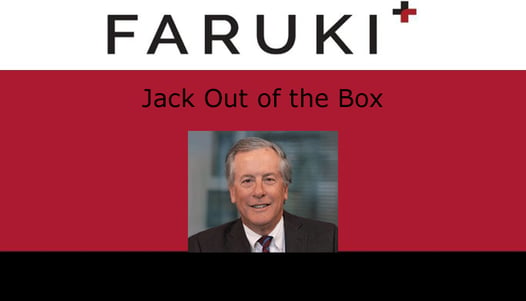- October 22, 2024
- Jack Greiner
- Jack Out of the Box
 In what I am pretty sure is a historical first, Donald Trump has just been sued for defamation based on comments he made in a Presidential Debate. And the people doing the suing might have a strong case.
In what I am pretty sure is a historical first, Donald Trump has just been sued for defamation based on comments he made in a Presidential Debate. And the people doing the suing might have a strong case.
In his disastrous September 10 debate, when not ranting about cats and dogs being eaten in Springfield, former President Trump addressed comments from Vice President Harris regarding Trumps' 1989 purchase of a full-page ad in the New York Times calling for the execution of five teenagers. These teenagers became known as the Central Park 5. Those 5 were wrongfully convicted and exonerated after spending much of their adult life in jail. In responding to the comments from Vice President Harris, Trump had this to say: "[T]hey come up with things like what she just said going back many, many years when a lot of people including Mayor Bloomberg agreed with me on the Central Park Five. They admitted – they said, they pled guilty. And I said, well, if they pled guilty they badly hurt a person, killed a person ultimately. And if they pled guilty – then they pled we're not guilty."
The problem with this statement is that it's false. Not one of the Central Park 5 pleaded guilty. And none of the victims of the crime were killed. And Michael Bloomberg was not Mayor of New York in 1989. The new York Mayor at the time Trump placed the ad was Ed Koch, who was quoted as saying "[n]obody I know of in Western society believes that under any circumstances would you ever impose the death penalty on juveniles."
So how is it that an ad taken out in 1989 can be the subject of a 2024 lawsuit? Hasn't the statute of limitations run? The answer is that Trump isn't being sued for the 1989 antics. He is being sued for his September 10, 2024 comments, well within any statute of limitations. The quick backstory of the Central Park 5 is that they were coerced into "confessing" to the crimes after hours of interrogation outside the presence of counsel. The convictions were vacated in 2002, because another perpetrator confessed, and DNA evidence demonstrated the Central Park 5 were not involved. The New York District Attorney's Office agreed with the decision to vacate the convictions, noting that "the People's case at both trials rested almost entirely on the statements made by the defendants. . . . But a comparison of the statements reveals troubling discrepancies. . . . The accounts given by the five defendants differed from one another on the specific details of virtually every major aspect of the crime – who initiated the attack, who knocked the victim down, who undressed her, who struck her, who held her, who raped her, what weapons were used in the course of the assault, and when in the sequence of events the attack took place . . . In many other respects the defendants' statements were not corroborated by, consistent with, or explanatory of objective, independent evidence. And some of what they said was simply contrary to established fact." The exonerated men later sued New York City and settled for $41 million.
As their defamation complaint notes, "[the Central park 5] pled not guilty on all counts. They would all maintain their innocence throughout their trials and years in prison—even when this later hindered them from obtaining parole and extended their incarcerations." Trump's statement at the debate – that the five pleaded guilty – is demonstrably false on its face. Given that accusing someone of committing a crime is defamation per se, Trump may be in for another adverse defamation finding.
Trump's defense will likely center on the initial confessions, contending that his statements were "substantially true" in that the five at one time allegedly admitted to the crime. But given all of the baggage around the confessions, and the later actions of the DA and the Court, this might be tough to sustain. A better strategy for Trump going forward would be to stop lying.
